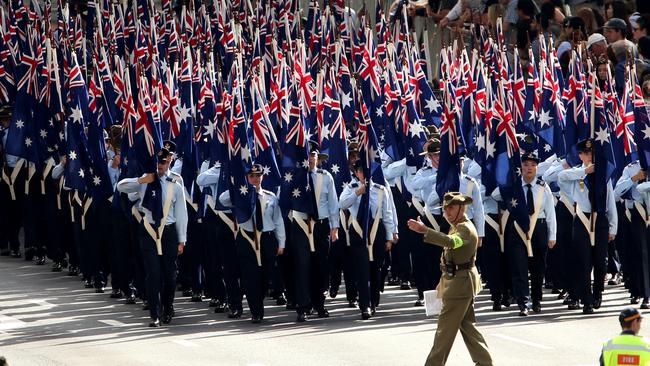War hero Tom Bicknell’s remarkable story of survival as a Prisoner of War
WHEN Lance Corporal Tom Bicknell found himself lying in a cattle truck with a pile of dead soldiers he thought ‘This could be it’. But one of his “Band of Brothers” saved him with three eggs and mateship.

Manly
Don't miss out on the headlines from Manly. Followed categories will be added to My News.
SEVERAL times Tom Bicknell thought he was going to die as he battled starvation, exhaustion, disease and torture as a Japanese prisoner of war.
But when the lance corporal found himself lying in a cattle truck with a pile of dead soldiers, near Bangkok in Thailand, he thought, “This could be it”.

His body had nearly given up after toiling on the infamous Thai-Burma Railway for more than six months.
More than 12,000 Allied soldiers died there in horrific conditions, being forced to work with primitive tools and their bare hands in disease infested areas, on just two spoonfuls of mouldy rice per day.
“They’d pulled me off the truck with all the dead ones,” said Mr Bicknell, 93, who had lied about his age so he could enlist at age 17.

He was taken prisoner when Singapore fell in February 1942, after fighting the Japanese for more than a month in Malaya and Singapore.
Too weak to move, he would have died in the dirt alongside the corpses at Ban Pong station, but he was saved by “absolute sheer bloody luck”.
One of his ‘‘band of brothers’’ – a group of six mates who had been through hell together since first meeting during training in Bathurst – just happened to be unloading the corpses and recognised him.
Don Mackenzie, like Bicknell, was just skin and bones at this stage and was hardly able to stand.
But somehow he summoned the strength and wit to steal three eggs.
As he made his way back to his mate, he dropped one of the eggs, but he scooped it up and kept going.
“He’s lying alongside me holding my hand, saying, ‘don’t give up Tom, don’t give up’,” said Bicknell, who now lives at residential home RSL LifeCare Narrabeen.
“And I’m saying, ‘never, never, never’. That’s all I can remember saying.”

For three days they lay together beside the railway tracks, with Mackenzie feeding Bicknell two of the eggs and small sips of water, while he himself had the egg with all the dirt in it.
The Japanese showed no interest in the two diggers.
Eventually, Mackenzie managed to haul Bicknell into a railway cattle truck going south to Singapore.
It was standing room only and many died on that journey back to Changi.
“I still don’t know how long it took, probably three, four, five days,” remembers Bicknell.
“It’s a fair distance anyhow. That was a bloody terrible thing.”
Back in Changi POW camp, the pair were immediately sent to hospital, where Bicknell stayed for more than seven months.
After that, he was sent back to work building Changi airfield and then digging tunnels, which he later learnt the Japanese had planned to use to entomb their prisoners if they were invaded.

Through three-and-a-half years of hell as a POW, it was the love for his wife-to-be Fay back in Sydney, and his ‘‘band of brothers’’ from the 2/30 Battalion – Charlie McEwen, Arch Dickinson, Ron Sweeney, Hilton McLaren and Don Mackenzie – that kept him going.
“I refused to die,” said Bicknell.
“It’s as simple as that.”
Miraculously all six mates survived, and when the Japanese surrendered in August 1945, the horrified Gurkhas who were first into Changi found them skeletal and very sick.
“My clothes had all gone but I had on some boots and a jock strap and this little Gurkha took his shirt off and tried to put it on me,” Bicknell said.
The much-loved father, grandfather and great-grandfather has never told his story publicly until now.

Partly, because it’s so horrific and he has tried to forget, but also because he has long felt that Australia was ashamed of the POWs who were captured in Singapore.
Astonishing as it may seem now, he and his fellow diggers were not treated as heroes on their return, but booed as they disembarked in Sydney and he remembers one time being called a coward.
He and sweetheart Fay wasted no time marrying and she nursed him back to health. It took six months.

“I couldn’t sleep, I couldn’t walk, I couldn’t eat, I couldn’t lie in a bed,” said Bicknell, who also suffered terrible nightmares, which still affect him to this day.
“She rebuilt me.”
His services to Australia were officially recognised only three months ago, when he was invited to a reception at Government House.
“I felt very humbled,” he said.
“I felt at last it was acknowledged that I wasn’t just a prisoner of war, but I was in a battalion that fought until the last minute before the surrender of Singapore.
“We had to let the nurses escape.”
Bicknell is the only surviving member of the band of brothers today.
He said he wished they were all still alive so they could know the Australia of today was proud of them.



